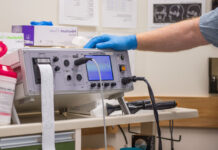Clinical psychologist Dr Lucy Johnstone writes:
The very first Maudsley debate in 2000, before recordings were made, was on the topic of Electroconvulsive Therapy (ECT). The motion was ‘This house believes ECT is barbaric and ineffective.’ I and Judi Clements, former CEO of MIND, supported the motion and it was opposed by Dr Mark Salter and Dr Tom Stuttaford. The chair was Dr Raj Persaud. It was a fascinating but also depressing experience to dig out my old notes (a transcript of my talk appears below.) Subsequently I was invited to write a more detailed overview of the arguments for The Psychologist, which can be found here.
An account of the debate was published on the ECT Anonymous website and can be found here. It describes the results, which showed a similar trend to the more recent debate; the motion was not carried, but there was a swing towards supporting it. The final result was not nearly as close, though – 94 for, 138 against. Perhaps we can take some small comfort from the fact that over the last 18 years, concerns about ECT seem to be increasing.
In my talk I referred to the psychological damage caused to some people by ECT, and reported my research into this often overlooked issue in this article. This research was cited in the NICE Guidelines on ECT 2003 (updated in 2009) thus: ‘While some individuals considered ECT to be a beneficial and lifesaving treatment, others reported feelings of terror, shame and distress, and found it positively harmful and an abusive invasion of personal autonomy, especially when it was administered without their consent’ (section 4.3.2.) Several ECT recipients told me how they had experienced it as re-traumatisation following sexual abuse earlier in their lives. It is heart-rending testimony. Today we have the language of trauma-informed care to describe the way in which services can, unintentionally, repeat and compound the traumas and abuses that have brought people into services in the first place. However, this still seems very hard for professionals to take on board.
In my many years as a clinician, I have certainly met people who seemed to get temporary benefit from ECT (with the provisos outlined below.) In several of them, it seemed to me, this simply delayed or avoided recognising their underlying difficulties. One woman, back in the 1990s, was struggling to escape a very troubled marriage. ECT seemed to work in exactly the miraculous way sometimes claimed; she brightened up, left hospital, indulged in an orgy of cleaning, and was reported by her delighted husband to be cured. A few weeks later, she was re-admitted. The temporary euphoria had worn off and she now felt that she had exhausted all her options. She killed herself a week later. I can still remember her grieving husband thanking the consultant for the short respite that, from his perspective, ECT had given her.
Another woman, a long-term client, was found purely by accident after a serious suicide attempt. She had felt herself slipping into depression again, but having had a previous terrifying experience of ECT, and failing to get assurances from her psychiatrist that she would not be given it again, overdosed as a way out. It was not her depression that nearly killed her – it was the proposed ‘treatment.’ Another example comes to mind – a furious, volatile woman who had been gang-raped as a teenager. When she was prescribed ECT, for some reason the anaesthetic didn’t work, and lying paralysed on the couch, she relived all her earlier trauma. And here is another memory: Yet another woman roamed the ward, mute and remote, inaccessible to anyone. One day she opened up to me. She had had ECT while pregnant, and it had precipitated the miscarriage of a much-wanted child. Having revealed this awful secret, she closed down again, and I was never able to re-visit it. I told this story to the team in the next ward round. There was a shocked silence. No one commented, and the team quickly moved on to the next patient.
I believed then, and believe now, that there is a huge hidden pool of ECT-related trauma – in terms of both cognitive and psychological effects – that we have hardly begun to recognise. This is the pattern with exposure of any area of trauma – domestic violence, sexual abuse, or whatever. Iatrogenic trauma – caused by what is meant to be the ‘treatment’ – invites more than the usual amount of evasion, dishonesty and silencing, because of the collusion by professionals and their ruling bodies. There is simply no excuse for this. I congratulate John Read and Sue Cunliffe on their brave stance, and I look forward to the day when, inevitably, ECT will be seen as the barbaric and inhumane practice that it is.
ECT debate at the Maudsley 26thJanuary 2000
Summarising the arguments against ECT in 10 minutes is an impossible task – not just because it’s such a short time, but because the research is so complex. The problem is that whatever people may tell, you, there is no such thing as the established ‘facts’ about ECT. You can find evidence to back up any viewpoint. As in other areas of psychiatry, the ‘facts’ that tend to be presented as the truth are those which support the status quo, and other equally well-supported findings get somehow ignored or misrepresented. So here in brief is my own summary of the argument and the evidence.
Does ECT work? Curiously, there is virtually no hard evidence that it does. About the only properly designed and controlled studies concluded in 1992 that it is only effective in people who are so depressed that they are actually retarded and ‘deluded’, and even then only at 4 weeks. By 6 months any advantage is not detectable. This suggests that even in severe depression, other forms of care are a valid alternative. In fact, various different reviews have failed to find any convincing studies that show benefits lasting more than 4 weeks, It is always worth checking back to the original sources when psychiatrists make more sweeping claims. For example, the RCP factsheet on ECT says that 8 out of 10 people benefit from it. They don’t give a reference for this claim, but as far as I can discover, it actually refers to a 35 year old paper that concluded that ECT is no more effective than anti-depressants or placebo (Greenblatt et al 64.)
Does ECT prevent suicide? You can find plenty of psychiatrists who will tell you that ECT has saved someone from suicide by relieving their depression. This of course is just a personal impression, and if you respond with examples of people who killed themselves citing ECT as the reason (of whom there are many; Ernest Hemingway being the most famous), you are likely to be told that this is merely ‘anecdotal evidence.’ However there is no research evidence that shows ECT reducing the suicide rate. The paper that is most often cited as evidence that it does, is another example that repays careful reading; in fact it concludes: ‘In the present study, ECT was not shown to affect the suicide rate.’ There are, on the other hand, a number of other studies showing increased death rates from all causes up to 2 years after ECT, especially in older people. We can’t be sure that ECT saves lives but we can be sure that at least sometimes it kills, if only from the unavoidable risks associated with having a general anaesthetic, and from other heart-related complications as well.
So, is ECT worth it for the small minority who do seem to gain some temporary benefit? Well, this depends not only on whether it can help, but whether it can also do harm. In any medical intervention you have to weigh the risks against the benefits, and in the case of ECT, despite what you may have been told, or read in information leaflets, there is a massive amount of evidence of long-term damage to memory and general brain function. It comes from animal studies, human autopsies, human brainwave studies, MRI scans, memory tests and so on, not to mention the personal testimony of thousands of ECT recipients. This isn’t really surprising when you think how hard doctors try, in other contexts, to avoid repeated epileptic fits, or how seriously they would take an accidental electric shock to the head which caused concussion. Nor was there any attempt to deny the damage in the early years of ECT’s use. Here is a quote from 1946: ‘It is not unusual to hear prominent psychiatrists and neurologists express the opinion that improvement from any of the shock therapies…. must necessarily depend on brain tissue destruction’ (Wilcox, 1946.) This was a view put forward quite unashamedly by ECT’s advocates. I really do not think anyone can sensibly dispute it.
This raises the whole question of how ECT does have an effect, in the cases where it does seem to help. The RCP factsheet states confidently: ‘Repeated treatments alter chemical messages in the brain and bring them back to normal.’ This is unsubstantiated nonsense. A more honest comment comes from Richard Abrams, author of the standard textbook on ECT, who wrote: ‘Modern researchers do not have any more of a clue to the relationship between brain biological events and treatment response in ECT than they did at the time of the first edition of this book – which is to say, none at all.’ And a more honest answer might be to admit that memory loss, denial and euphoria which are known aftereffects of head injury can sometimes be mistaken for temporary improvement.
There is also my own recent research which is an attempt to document some of the enormous psychological trauma that ECT can inflict, leaving people feeling terrified, betrayed, assaulted, humiliated, powerless and abused, with their original emotional problems disastrously compounded, and with a lasting distrust of psychiatric staff. People told me things like: ‘It felt like I had been got at, yes, bashed, abused. It did feel like an assault.’ ‘It was like I was a non-person and it didn’t matter what anyone did to me.’ ‘At the time I was completely convinced I was being punished for something… I thought, well I must have done something wrong to be treated like this.’
I’m sure that doctors prescribe ECT with the best of intentions, and I’m sure that there are some people who feel they are helped by it, but in order to justify its continued use we need to be certain that the temporary benefits to a tiny and fortunate minority outweigh the risk of permanent damage to the rest. We also need to be convinced that such a procedure is ethically justified. In the words of neurologist John Friedberg: ‘Assuming free and fully informed consent, it is well to reaffirm the individual’s right to pursue happiness through brain damage if he or she so chooses. But we might well ask ourselves whether we, as doctors, sworn to the Hippocratic oath, should be offering it.’ Let us not forget that our first duty is to do no harm.
If you talk to lay people about ECT, they tend to say two things: ‘I thought that went out years ago’ and ‘But that’s barbaric, isn’t it?’ Of course there are always experts on hand to tell lay people that their instinctive reactions are wrong. But in this case they, along with many thousands of service users, are right. It IS barbaric, and it SHOULD have been banned years ago. It is the 3rdmillennium, and it’s time to make some real changes. It’s time to end the practice of ECT now.




[…] Pych: Ramones: Shock Treatment. Notes From the First Maudsley Debate, January 26, 2000 https://www.madintheuk.com/2018/09/notes-from-the-first-maudsley-debate-january-26-2000/ … via […]
[…] https://www.madintheuk.com/2018/09/notes-from-the-first-maudsley-debate-january-26-2000/ […]
Dear Dr Johnstone,
Thank you for this article. I don’t see how electricity and physical violence can be good for the brain.
My introduction to the Mental Health System was at the Maudsley Hospital in 1980 where I initially requested psychotherapy but was refused on the grounds of supposedly having a “chemical imbalance in the brain”.
I was a registered mentally disabled person (with Severe Mental Health Diagnosis) up until 1984, when I took myself off strong Psychiatric drugs.
But my Recovery was due to “Psychotherapy”. I can establish that I did recover and that my disability ended in 1984, and I can describe the means by which I recovered through Psychotherapy.
Really interesting. It seems to me that to carry out a treatment you need a significant and sensible effect measure, a credible mechanism of action, and a good grip on the potential harms. We don’t seem to have any of these in ECT (or any other psychiatric intervention actually, but lets not go there).
It was interesting to see the proponent of ECT at the debate point to the impressive effect size – but of course, as you point out, the critical issue is when to take this measure.
The big problem in psychiatry is what could perhaps be called observation bias. It can also be called clinical experience lol. But basically, since time immemorial, psychiatrists misread what they are observing, and are biased towards believing that their interventions must be making a positive difference. With ECT there is a short term improvement but subsequent relapse, which gives rise to the ghastly solution of “maintenance treatment”, where you need to be totally sure you are doing no harm, otherwise you are progressively damaging the patient, to put it mildly.
The other problem is what you might call patient desperation bias. Someone who is suicidal will candidly say, yes, lets risk everything with this treatment because I’m knackered anyway. To them I say be careful you may be throwing what chance you have down the drain by going for ECT, but from their unequivocal position of doom its not going to carry much weight.
I do wish psychiatrists (and clinical psychologists actually) would really try and understand the patients viewpoint, deeply. In a relationship of trust based on total honesty, respect, evidence and never forced treatment. The mistake they make when they see ECT working is all down to the superficiality of their assessments and their patronising views of the patient, which are always made from the other side of the table under the bright lights of the clinic, not the real world.
I was at the recent Maudsley (ECT) Debate where Dr Read (I believe) mentioned the Medieval Twirly Chair.
The ECT practitioners totally denied the electrical brain damage – and got away with it.